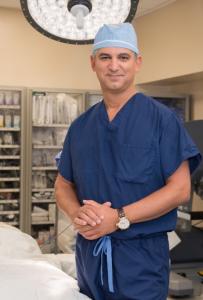Dr. David Samadi: Why all men need a urologist
NYC urologist and prostate cancer surgeon discusses why at some point in most men’s lives, the medical skills and knowledge of a urologist will be necessary
Their expertise can be a game changer in resolving men’s troublesome urinary issues.
What is a urologist?
Urology deals with the health of the urinary tract system and reproductive system of men. Urologists monitor how well these bodily systems are working, playing a significant role in their care.
Urologists can help men with various medical issues, including urinary incontinence, bladder infections, pelvic muscle weakness, erectile dysfunction, prostate enlargement, and prostate cancer.
The health of men's urinary system is vital, especially as they age. Establishing a relationship with a urologist is essential for men to address any potential issues.
Here is a list of some of the most common urological issues urologists can treat:
• Kidney stones
Cloudy or bloody urine, difficulty urinating, or severe pain in back, side, groin or lower abdomen may indicate kidney stones. See a urologist immediately for an accurate diagnosis and treatment.
Sound waves or medications can assist in passing a kidney stone successfully. If it cannot pass, surgery may be required.
Urologists can teach lifestyle techniques to prevent kidney stones such as increasing water intake, consuming calcium-rich foods, reducing sodium, oxylate, and animal protein, and avoiding vitamin C supplements.
• Urinary incontinence
Men experiencing bladder control or urinary incontinence should see a urologist. The urologist will determine the cause, including whether it’s being cause by an enlarged prostate, obesity, sedentary lifestyle, or overactive bladder.
Urinary incontinence treatment varies depending on the cause. It can include medications, surgery, or lifestyle changes such as Kegel exercises, bladder training, and avoiding caffeine and acidic foods before bed.
• Erectile dysfunction
Erectile dysfunction can significantly impact a man's confidence and relationships. Urologists can identify and treat contributing factors such as testosterone deficiencies, diabetes, heart disease, or depression in men.
Treatment options for ED may include medication, therapy, and lifestyle changes.
• Benign prostatic hyperplasia
The most common medical condition affecting the prostate gland is benign prostatic hyperplasia (BPH). It becomes more prevalent as men age, with almost half of all men developing it past 50.
BPH is a non-cancerous prostate gland enlargement that causes frequent urination, difficulty starting a urine stream, dribbling, and inability to empty the bladder, though it is considered harmless.
For men with BPH, lifestyle changes like Kegel exercises, steady fluid intake, and avoiding certain meds can help. Seeing a urologist is recommended for effective symptom management.
• Prostate Cancer
Prostate cancer is common in American men, causing malignant prostate gland cells to grow uncontrollably. Seeking a urologist oncologist for treatment is recommended for those diagnosed with this disease.
Many treatment options are available for prostate cancer, including active surveillance, radiation, and surgery. Urologists are invaluable for guiding men on understanding and choosing the best treatment option for their case. It's important to note that every man's situation is unique, and what works for one man may not necessarily be the best choice for another.
Dr. David Samadi is the Director of Men’s Health and Urologic Oncology at St. Francis Hospital in Long Island. He’s a renowned and highly successful board certified Urologic Oncologist Expert and Robotic Surgeon in New York City, regarded as one of the leading prostate surgeons in the U.S., with a vast expertise in prostate cancer treatment and Robotic-Assisted Laparoscopic Prostatectomy. Dr. Samadi is a medical contributor to NewsMax TV and is also the author of The Ultimate MANual, Dr. Samadi’s Guide to Men’s Health and Wellness, available online both on Amazon and Barnes & Noble. Visit Dr. Samadi’s websites at robotic oncology and prostate cancer 911.
David Samadi
Madison Urology
+1 2123655000
email us here
Visit us on social media:
Facebook
Twitter
LinkedIn
Instagram
YouTube
Are men really taking less care of their health? Dr. Samadi explains
Legal Disclaimer:
EIN Presswire provides this news content "as is" without warranty of any kind. We do not accept any responsibility or liability for the accuracy, content, images, videos, licenses, completeness, legality, or reliability of the information contained in this article. If you have any complaints or copyright issues related to this article, kindly contact the author above.

